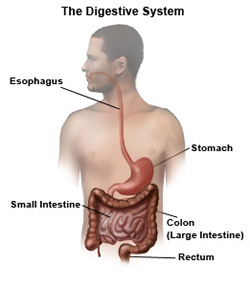
MUSCLE QUALITY AND GASTROINTESTINAL HEALTH
Answer: Gerd, acid reflux, inflammatory bowel syndrome (IBS), diverticulosis, colitis, Crohn’s disease, cramping, and colon cancer. Question: What are the most common gastrointestinal problems people experience?
THE GASTROINTESTINAL HEALTH CRISIS
Gastrointestinal, or GI problems, are rapidly growing conditions that affect 60-70 million people with costs escalating over $142 billion nationwide. While the number of people with these conditions is growing at an alarming rate, some experts in the area are unsure of the causes and even the necessary treatments. While we needn’t rehash here some of the possible mechanisms that cause these GI and autoimmune issues (please see Gerianne Cygan’s posts on grains or check out Dr. William Davis’s Wheat Belly book), you can visit your local Exercise Coach® franchise and feel the difference. We will want to investigate how improving muscle quality and applying Right Intensity Training™ can, simply yet powerfully, aid in the reduction of these ailments.
HOW THE GI TRACT WORKS
The gastrointestinal (GI) tract is the path food takes from entering your body until it leaves. Foodstuffs go from your mouth, pass through your esophagus, enter your stomach, are squeezed through your small intestine, and finally pass through your large intestine (colon).

MUSCLE QUALITY AND GASTROINTESTINAL HEALTH
While many GI problems can be dramatically impacted by changing dietary habits, meaningful exercise can have a profound effect. Many GI issues are related to inflammation, which exercise certainly reduces. Inflammation is a topic we will delve into more in the future. While many GI issues harm the quality of our lives, it is the GI issue of colon cancer that is life-threatening. The good news, however, is that positive exercise outcomes have been shown to decrease the risk of colon cancer by up to 50%! While the mechanism by which the risk diminishes so drastically is not completely affirmed, many believe it is the decreased time waste spends in the large intestine, which in turn decreases its exposure to bacteria and carcinogens. Another way that improved muscle quality reduces the risk for cancer is through the relatively high association of Type II diabetes and colon cancer.*
While proper nutrition and Right Intensity Training™ (which improves muscle quality), are critical in the fight against GI problems, it’s worth noting that overtraining and prolonged aerobic/high intensity training, has been known to increase GI problems. While many of the symptoms experienced are not life-threatening (dizziness, nausea, stomach or intestinal clamps, vomiting and diarrhea), some may have greater effects on the long-term health of our gut (“damage to the gut and impaired gut function is associated with increased intestinal permeability”).
So what’s the takeaway from all this talk about gut health? The same formula that we have already established improves neurological function, glucose metabolism, bone health and heart disease risk: Right Intensity Training™ + Whole Food Nutrition = Whole New You!

* See articles: What are the risk factors for colorectal cancer? and Type 2 diabetes mellitus as risk factor for colorectal cancer
Read the rest of this series:
Muscle Quality: Improving It Will Change Your Life
Muscle Quality and the Neurological System: Part 1
Muscle Quality and the Neurological System: Part 2
Muscle Quality and Cardiovascular Health
The Downside to prolonged “Cardio”
Muscle Quality and Osteoporosis
How to Combat Osteoporosis through Strength Training
Muscle Quality and Gastrointestinal Health
Muscle Quality and Inflammation
Muscle Quality and Brain Health